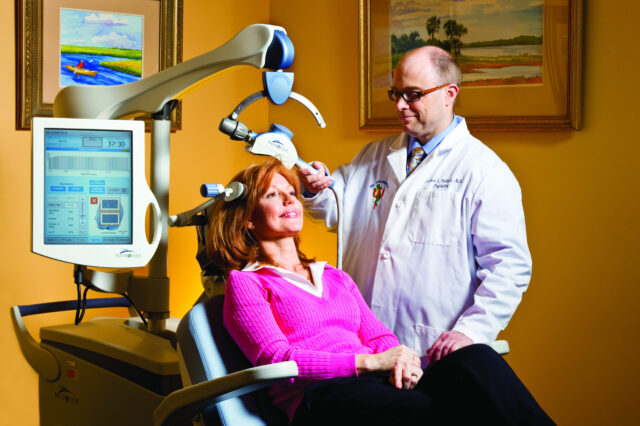UF Health first in Florida to earn National Network of Depression Centers designation

The University of Florida’s Mood Disorders Program, spearheaded by the department of psychiatry at UF’s College of Medicine, was recently named a center of excellence by the National Network of Depression Centers, or NNDC. UF Health is the first academic health center in Florida to earn this distinction.
The NNDC is a consortium of leading academic health centers working to accelerate research, education and improved treatment options for patients suffering from depression, bipolar disorder and other mood disorders.
“Increasing rates of depression and suicide among many populations, including youth, veterans, medical students and physicians, make it particularly timely that UF Health joins national efforts to improve prevention, clinical care and recovery for patients with mood disorders,” said Regina Bussing, M.D., chair of UF’s department of psychiatry and a member of the Evelyn F. and William L. McKnight Brain Institute of the University of Florida.
UF Health joins 21 other NNDC centers of excellence, including the Mayo Clinic, Stanford University and Johns Hopkins Medicine. “We are excited to collaborate with this prestigious group of colleagues in this capacity and to contribute to the momentum achieved by UF’s Top 10 status,” Bussing said.
The NNDC unites experts across the U.S. who pursue initiatives in education, research, clinical care delivery and community outreach; engage in interdisciplinary collaborations within their home institution and across the network; and identify opportunities for multisite studies and emerging partnerships.
“We are thrilled to welcome UF Health as our newest center of excellence,” said NNDC executive director Pat Rinvelt. “Their interdisciplinary approach to research and patient care has built strong ties not only in other departments at the university, but across the Gainesville community and beyond as well. It is an approach that strongly resonates with the founding principles of the NNDC.”
The NNDC center of excellence designation comes at a time of growth for the department of psychiatry in the areas of depression, bipolar disorders and other mood disorders. Advancements are underway in all of the department’s mission areas — the multidisciplinary care provided at UF Health Springhill, the UF Health Shands Psychiatric Hospital and the UF Health Florida Recovery Center, or FRC; the leading-edge research put forward by the UF Center for OCD, Anxiety & Related Disorders, the UF Center for Addiction Research and Education and the Pottash Research Initiative at FRC; and robust residency and fellowship programs.
Bussing says the designation will help accelerate efforts to enhance and expand care for those affected by depression and mood disorders.
“It is well-established that depression disproportionally affects patients with other chronic health conditions and that untreated depression results in worse outcomes,” she said. “It is ever more important that we develop evidence-based methods to deliver depression care in general medical settings to achieve optimal outcomes. By collaborating through the NNDC network, we will further expand our reach and contributions.”
About NNDC The NNDC, a nonprofit 501(c)(3) collaborative research network, unites mood disorders experts from around the country to harness the collective power and resources of network members, seeking to expedite scientific discovery and advances in patient care for people with mood disorders. Its membership includes many of the nation’s top medical institutions. Acceptance involves a rigorous application process detailing high levels of expertise in clinical delivery, research and education.
About the author
